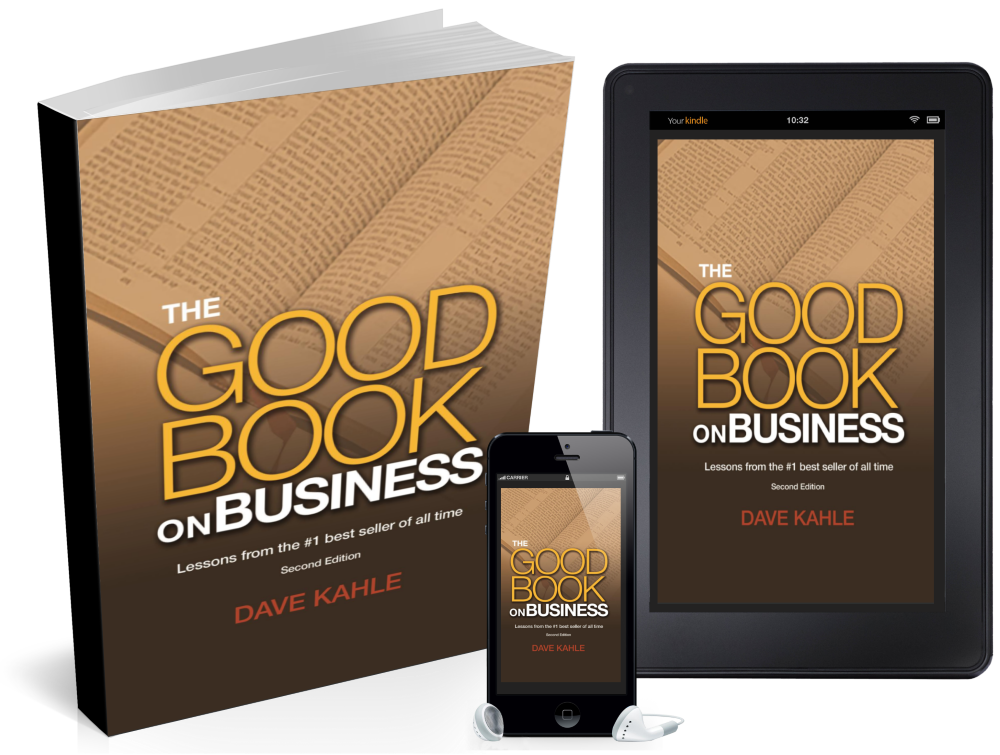
Dave Kahle
The Good Book on Business Table of Contents
The Good Book on Business Sample Chapter
Read below or download the Fully Formatted Chapter here:
www.thebiblicalbusiness.com/content/good-book-sample-chapter-four.pdf
Chapter Four:
Abraham – a biblical business on steroids
As the population increased, work necessarily morphed into a more sophisticated version which today we call a business. The Bible refers to these emerging organizations as ‘households.’ Households were formed as a result of individual families struggling for economic security. The head of the house found some ‘work’ to do, and naturally the whole family helped with that. As is the case today, and ever since, some people were better at their business than others, and they inevitably attracted servants, slaves and employees to expand the family business. Generally, these folks – the servants, slaves and employees (the equivalent of today’s employees) lived in the same compound as the head of the household, and their families were considered to be part of the business as well.
One of the most successful of these early businesspeople was Abraham, who, by no coincidence, was chosen by God to become the father of the special people group that he set aside to be dedicated to him – the Hebrews.
We get a glimpse of how large Abraham’s business was in this passage, which describes a story in his life. Abraham was close to his nephew, Lot. Lot and his household had been captured by the enemy, and Abraham (then known as Abram) is going to go after them:
Genesis 14:14
When Abram heard that his relative had been taken captive, he called out the 318 trained men born in his household and went in pursuit as far as Dan.
Let’s think about that. If there were 318 trained men who had been born in his household, how many untrained men must there have been in that household? How many boys who were too young, men who were too old, how many women and children? The size of Abraham’s business would have incorporated thousands of people – a massive enterprise.
Imagine the logistics involved in employing, organizing and caring for thousands of people. There would have been layers of management and specialization. Who selected and trained that fighting force of 318 men, for example? Someone probably was tasked with identifying the most likely candidates, acquiring the weapons, developing the training routines, and sharpening the skills of that group.
So, we get a glimpse of the first really big business in the Bible – Abraham’s household.
For those who hold that households are just another name for families, notice that Abraham had built a huge household, and had no family. His wife, at this point in his life, was childless.
The story of Abraham adds to our understanding of Biblical businesses as we discover a powerful business principle. Let’s call it “preparation for contingencies.” How did those 318 trained men come into existence? Abraham must have identified the need for a fighting force to defend the business and its people in the event of an attack from outside. He was incredibly wealthy and ran a business with thousands of people who were dependent on the business for their livelihood. His holdings in crops, cattle, sheep, vineyards, etc. must have been extensive. As his business grew, so did the likelihood of a raid by an outside group, intent on taking some of what belonged to Abraham.
Thinking ahead, Abraham would have decided to prepare for that eventuality, and train and equip a fighting force to defend the business and its people.
Which brings us to another biblical principle: specialization, which we see for the first time in Abraham’s business. Those 318 men were specialists in some aspect of the business – in this case, soldiering. Abraham, the first really big Biblical businessperson, knew that some folks were better at some things than others, and organized them to specialize in those things – a decidedly modern strategy.
Today we have lots of tools to help us assess a person’s skills and aptitudes in order to put them in the right job. While Abraham didn’t have the sophisticated tools we employ today, he understood the principle, and created this special force of 318 warriors.
In the bigger Bible story, God chose Abraham to be the father of his nation because of his great faith. The depth of that faith is revealed in one of the famous stories of the Bible. Here’s the story:
Abraham and his wife, Sarah, were childless. Sarah grew beyond child-bearing age and had given up on having children. But God, in fulfillment of his promise to make Abraham the father of a great nation, had miraculously intervened, and Sarah, in her old age, became pregnant with Isaac. The child was born and was destined to inherit both his father’s business as well as the promise from God. As an only child of the couple, the bloodline would necessarily proceed through Isaac, and the promise that was made to his father, was then extended to him.
In a test of Abraham’s faith, God commands Abraham to sacrifice Isaac, in the same way as he would sacrifice an animal. Abraham obeys. He leads Isaac off into the wilderness, builds an altar, places his only son on that altar, takes out his knife, and prepares to kill his son. God intervenes, stops Abraham, and Isaac lives and goes on to be another pivotal person in the Bible narrative. Abraham has passed the test and proven his faith and obedience.
The biggest lesson to add to our understanding of Biblical business has to do with the intertwining of Abraham’s business with the development of his faith. Clearly, he had an enormous depth of faith that expressed itself in his obedience to God’s command to sacrifice Isaac. But how did he come to that level of faith?
Faith, in most people, grows over time. We generally begin our relationship with God with a small degree of faith (as large as a mustard seed), and overtime add to our level of faith. It’s interesting to note that God did not put Abraham to this incredibly difficult test of his faith until he was an elderly man and had developed a powerful faith.
How did Abraham, over the course of his life, develop such a legendary level of faith?
Often people develop faith as they live through the successes and calamities of raising children. As a father, adoptive father, foster father and grandfather, I can attest to that. But Abraham did not have a family until his later years when his faith was well established.
He did not have access to any of the accoutrements of modern-day religion, which we expect to be the mechanism to instill and develop faith: no churches, no scripture, no pastors, and no church services.
How, then, did he come to this legendary faith?
Could it be that the venue in which He encountered God and grew to depend on and obey him was the same venue in which God showed himself to Adam? God set the precedent in the first few chapters of Genesis – it would be in work that God would interact with mankind. Understanding that, would it not be reasonable to expect that Abraham encountered God in the context of his business? Was it in Abraham’s work, expressed in the more sophisticated version of his business, that Abraham encountered God, grew to know him, and come to a level of faith and obedience that is legendary?
God set the precedent in the first few chapters of Genesis – it would be in work that God would interact with mankind. Understanding that, would it not be reasonable to expect that Abraham encountered God in the context of his business?
With no family, running an enterprise of this size would have occupied the majority of Abraham’s time. And, it was there, in the relationships with his servants and slaves, in the countless thousands of conflicts he had to negotiate, and the myriad decisions he would have had to make, the thousands of conversations and interactions, Abraham encountered God and developed his legendary faith. God showed up in Abrahams’s work, just as he did with Adam.

About Dave Kahle
Dave Kahle has been a Bible teacher, elder, house church leader, short-term missionary, and Christian executive roundtable leader. For 30 years, he has been one of the world’s leading authorities on sales and sales systems. In that regards, he has spoken in 47 states and eleven countries and has authored 13 books, several of which have been translated into eight languages and are available in 20 plus countries. He has personally and contractually worked with over 539 different businesses and focuses on helping his clients add $100 million in new revenue and 1,000 new jobs each year.
